- Home
- Vince Flynn
The Last Man Page 14
The Last Man Read online
Page 14
Kassar watched Rickman slump suddenly, his legs completely giving out. The Pakistani moved closer to the screen and tried to see what was wrong. It was not unheard-of for a subject to lose consciousness during an interrogation. Kassar checked his watch again and frowned as the two men continued to beat their unconscious prisoner.
It took them another minute to realize that something was wrong, and by then it was too late.
CHAPTER 22
BAGRAM AIR BASE, AFGHANISTAN
RAPP heard voices. He opened his eyes and looked up at a ceiling he was pretty sure he’d never seen before. His brain didn’t seem to be working quite right as the only thing he could figure out was that he was in a bed and his head hurt. The voices were coming from somewhere down by his feet. Moving his eyes caused discomfort, but he caught a glimpse of two men and a woman talking. None of their faces were familiar, but one of the men and the woman were wearing white coats. The other man was in what looked like light-blue pajamas. Rapp didn’t know why, but their clothes had some meaning to him that he couldn’t grasp.
He closed his eyes and let out a long sigh. Suddenly the three people were standing over him, two on his right and one on his left. He opened his eyes and could see their lips moving, but it was all scrambled. Suddenly the woman shined a bright light in his eyes. Rapp didn’t like it one bit, but his limbs felt as if they were encased in concrete, so all he could do was lie there. Thinking of moving them hurt his head, so he gave up on the idea and let the woman move the light from one eye to the other. When she finally clicked the light off he was so relieved he fell back asleep.
Rapp had no idea how long he’d been out, but sometime later he woke to find a familiar face. His head rolled to his right, and there in a chair next to his bed was someone who he knew was very important to him. He couldn’t come up with her name, or how he knew her, but he knew he should have known. In a moment of panic he asked himself if he knew his own name. He came up with that one pretty quickly, but when he asked himself where he was, a half dozen cities popped into his head, which got him wondering what he did for a living. Then things got really murky.
“You’re awake,” the woman said with a warm smile.
Rapp noted the familiar brown eyes, the glasses, and the auburn hair pulled back in a tight ponytail, and then something clicked. “Boss.”
Irene Kennedy said, “You had us a bit worried.”
“Where am I?”
“Heath Craig Joint Theater Hospital . . . Bagram Air Base.”
Rapp frowned and another link popped into his head. “Afghanistan?”
Kennedy looked at him with appraising eyes. “Mitch, what is your last memory?”
Rapp looked past her at the far wall. Some part of his brain was telling him to bluff his way through this, but another part was telling him he needed to tell her the truth. He couldn’t remember everything about her, but he knew she was someone he could trust—perhaps the only person he could truly trust.
“Is there any water around here?”
Kennedy grabbed a covered plastic glass with a pink straw sticking out of a round hole in the center of the lid. She raised the elevation on Rapp’s bed about six inches and then held the straw to his lips. After he’d had a good gulp, she repeated the question. “So . . . what is the last thing you remember?”
Rapp tried to recall, but nothing was coming to him. He gave a slight shrug and said, “I don’t know.”
“But you remember who I am? Where you work? Things like that?”
“It took me a moment to remember you . . . it didn’t come right away.”
“And where you work?”
“Ahh . . . I think it’s in Washington, but I’m not sure exactly where.”
“My title?”
“You’re my boss.”
Kennedy nodded. The doctors had warned her that things could be patchy. “I’m the director of the Central Intelligence Agency.”
“Oh,” Rapp said as something fell into place. “It’s coming back to me now.”
“Good. Do you remember my son?”
Rapp started to shake his head and then stopped because of the pain. “Sorry.”
“That’s all right. His name is Tommy. The two of you are rather close.”
“What happened to me?” Rapp reached a hand to his head and winced.
“There was an explosion. You hit your head. You have swelling on the brain. They call it a subdural hematoma.”
“Explosion?”
She shook her head. “I don’t think we want to get into that right now. The fact that you’re awake and fairly lucid is a good sign. The doctors tell me all of this is normal and with time you should regain most if not all of your memory.” Kennedy smiled and put on a brave face. Rapp was her top operative. Even at 90 percent he could be exceptional, but that depended on which 10 percent was lost.
“How long have I been out?”
“A little over a day.”
“A day?” Rapp asked in surprise.
“Yes.” And a stressful day at that. Twenty-one dead police officers, all killed by her men and an assassin, which further complicated the entire affair. She was sitting on that particular piece of information for the moment. The facts, as she’d gathered them, showed that Rapp and his men were left with no choice but to defend themselves. Those facts, however, didn’t matter to the Afghani people and their political leaders—at least not in the immediate aftermath of the slaughter. The president had ordered Kennedy to Afghanistan to see if she could straighten out the mess before the damage was irreversible. By the time she landed she was in possession of the information she needed. Her people had already identified the corrupt Afghani Police commander who had ordered the attack. The man had simply vanished, his government-sponsored house cleaned out of anything of value. Contacts within the Afghan National Police confirmed that most of the police officers who were killed were former Taliban members whom the corrupt commander had brought onto the force. They were all part of the State Department’s vaunted reintegration program. Kennedy gave the go-ahead for her assets to begin sharing this information far and wide.
By the time she landed, the Afghans were firmly split. One camp of hard-liners refused to blame anyone other than America for the catastrophe. It was no shock to anyone who followed Afghan politics that these men were the ones who had pushed reintegration in the first place. The second camp was made up of the various groups that had fought the Taliban for more than a decade and had warned the first group that their scheme of bringing them into the fold was short-sighted and naïve.
Kennedy arrived at the U.S. Embassy, and after giving Darren Sickles a very cool reception, she kicked him out of his office and called the president and his national security team. In her typical analytical manner, she relayed the information regarding the corrupt Afghan Police commander. The president asked just two questions. Did we suspect that this commander was a bad egg, and did Kennedy think this was linked to the abduction of Rickman?
The first question was easy to answer. The CIA had a file as thick as a phone book on Lieutenant General Abdul Rauf Qayem. They had warned the State Department that the man was hard-core Taliban and should not be included in the reintegration program. Kennedy relayed this as dispassionately as possible. The secretary of state would get beat up over this, and Kennedy didn’t need to pile on. They had a good working relationship and she wanted to keep it that way. The answer to the president’s second question was less clear. Kennedy wasn’t ready to share the information surrounding Louie Gould until she knew more. It was looking as if the abduction of Rickman and the attack on Rapp were part of a coordinated effort to damage the CIA’s ability to operate in Afghanistan. Until she had more information, though, she simply told the president that they were proceeding under the premise that the two events were linked.
CHAPTER 23
KENNEDY spent another ten minutes with Rapp, both answering and evading his questions and gently probing to gauge the depth of his memory loss. His inab
ility to recall information stretched across all aspects of his life. One pattern did emerge, though—his mind was blank when it came to anything that involved the last three days. Before that things were spotty, but Rapp’s recall seemed to get better as each memory fell into place. Not wanting to overwhelm him, she didn’t bother to tell him that in the middle of the night, the doctors had been on the verge of drilling into his head to drain the clotted blood that was creating pressure on the brain. The prognosis was very iffy at the moment.
The military doctors had ample experience with head trauma caused by explosions. Every case was different. Some patients progressed to a full recovery with nothing more than a week’s bed rest, while others never fully recovered despite the best effort and medical care. Kennedy would not allow herself to think the worst. Over the years Rapp had proven that he had an extremely strong ability to survive what would kill most people. His refusal to be deterred, despite overwhelming odds, while it often put him in harm’s way, was the very thing that drove him to never quit. Dying simply wasn’t an option.
His recovery right now depended on rest and relaxation—two things that were as foreign to Rapp as not barking at a stranger was to a dog. This put Kennedy in a unique quandary. She needed Rapp to find Rickman. There was no other asset up to the task. There were others who could help, but she needed Rapp’s fearless, ruthless behavior to deal with the miscreants who orbited their interests in this part of the world. Unfortunately, he was sidelined until the doctors told her otherwise. So far they were being vague, telling her he would likely be kept in bed for a week and then there would be another week of rehabilitation. A variety of symptoms could persist, including lethargy, slurred speech, difficulty in walking, blurred vision, numbness, headaches, amnesia, dizziness, and pain. The last part didn’t concern Kennedy. Rapp’s pain threshold was off the charts. She was betting that he would recover way ahead of the curve, but she couldn’t count on that, so she told him she had some things to attend to, but that she’d be back to see him in a bit.
Kennedy then found one of the doctors in the hall, an Air Force major, and told him that Rapp was awake. She filled him in on their conversation, and the doctor said this was a very positive development. He then excused himself and went to personally check on his patient.
Kennedy found Coleman in the small lounge with two of her bodyguards. She asked her men for a bit of privacy and sat down next to Coleman.
Kennedy grabbed Coleman’s hand. “You know you saved his life.”
Coleman was embarrassed. “Let’s not get all melodramatic.”
An uncharacteristically big smile spread across Kennedy’s face. “I don’t think you understand. You’ll be able to hold this over his head for years.”
Coleman joined in with a big grin. “Good point. The only problem is that I think he’s saved my life at least twice. I’m still behind.”
“His memory is a little shaky at the moment. Maybe he’ll forget he’s ahead. I’ll never tell him.”
“He’s awake?”
Kennedy nodded.
Coleman breathed a sigh of relief. “Thank God. How’s he doing?”
“He seems to be okay, but he doesn’t remember much.”
“What does that mean?”
“I’m not sure he knew who I was when he woke up. He recognized me, but he had to struggle to come up with my name. He remembered his own name, but he couldn’t tell me where he worked . . . at least not at first. As we talked, more and more things seemed to fall into place.”
“Rick?”
“No idea. In fact I don’t think he can remember a single detail over the past seventy-two hours.”
“Shit.” Coleman dropped his face into his hands. “So he’s out of commission.”
“I’d say for at least the next week.”
“What are we going to do?”
“I’m not sure at this point. Do you have it in you to take the lead?” Kennedy thought she knew the answer, but she needed to ask the question.
Coleman thought about it for a moment and then said, “I have the drive, but Mitch and I are very different. You know that. I’m not afraid to break a few rules and even a few noses, but I’m an amateur, compared to him. The only other person I know who could do it is Stan, and from what I heard yesterday, he’s not exactly up to the challenge.”
“What about Mike?” Kennedy asked, referring to Mike Nash, her counterterrorism director.
After inhaling sharply, Coleman shook his head. “I like Mike, but I’m not sure he’s cut out for this rough stuff. I don’t blame him. He’s got a wife and kids and you gave him an important job with a nice title. He’ll do well, and if he had his back to the wall, he’d do whatever it would take to survive, but that’s not what this is.”
“What is this?”
“You want Rick back, you need to find someone who’s willing to throw out the rule book. You need someone like Mitch who doesn’t give a shit about the politics . . . someone who’s fearless. Someone who will make these dirt bags fear for their lives.”
Kennedy agreed. The only problem was that she had no such man available. “Louie Gould . . . have you had a chance to talk to him?”
“Only briefly.”
“Do you buy his story?”
Coleman let out a small laugh that said what he thought of the question. “I’m not sure I believe a thing that comes out of that guy’s mouth. What does Mike say?” Nash and another CIA interrogator had been tag-teaming Gould since the night before, trying to sort through his lies.
“He says progress is slow. I’m going over there in a minute. Gould doesn’t know it but I have some leverage on him. He’ll tell us what we need to know and then some.”
“If we can find out who hired him . . . everything might fall into place.”
“It would be nice if it were that easy, but I’m guessing there are some firewalls in place that are going to make that very difficult.”
“Probably, but he might be able to point us in the right direction.”
“I’m counting on it.” Kennedy closed her eyes briefly and then said, “You lost a man?”
Coleman wore the fateful memory on his face. “Yeah . . . one of my best.”
“Mick Reavers.”
“That’s right.”
Kennedy could tell Coleman had some emotions that he hadn’t yet begun to deal with. She looked away and said, “Through back channels I’ve made it very clear that I want his body back by the end of the day.”
“I appreciate that.” Coleman looked across the room for a second and stared at a poster of an A-10 Warthog. “He never had a chance. They shot him before he even got his weapon up.”
It wasn’t often that Kennedy allowed herself to get pissed off, and it was even more rare for her to show it. She supposed she was filling the void left by both Rapp and Hurley. “Scott, I want to make something clear. We are not going to allow this crap to go unchallenged. I’ve got more shooters on the way over and within twenty-four hours I am going to have some targets for you. We’re going to find General Qayem. It might not be this week or the following, but you are going to find him and you are going to kill him. Do you understand me?”
Coleman nodded. “That’s what I was hoping you were going to say.”
“And by the time we’re done, my guess is there’s going to be a few more names added to our list.”
CHAPTER 24
INTER-SERVICES INTELLIGENCE HQ, ISLAMABAD, PAKISTAN
ASHAN had been summoned to the director general’s office, and he thought he knew why. His people had informed him of the developments across the border. Not only was Rickman gone, but another operative in Jalalabad had gone missing and there had been an attempt on Mitch Rapp’s life. As the deputy general of the Foreign Relations Wing, the only thing that surprised Ashan was that he hadn’t heard directly from the Americans. Even so, he had directed his people in both Jalalabad and Kabul to aid their counterparts from the CIA.
The ISI was an extremely controvers
ial yet influential part of the Pakistani government. In recent years there had been pressure to make the intelligence agency more accountable. Parliament had decided that the best way to avoid future scandal would be to make sure the head of the spy agency wasn’t anyone too special. In other words, they wanted someone they could control. They found just the person in Air Force General Ahmed Taj. Taj’s career in the Air Force had been spent almost entirely in supply and logistics. He had both a fondness and an aptitude for moving men and equipment from point A to point B.
Ashan had noticed this some time ago, as it seemed that nearly every time he was called to Taj’s office he was ordered to get on a plane and go somewhere. When he’d been informed of the meeting, he called his wife and asked her to pack a bag for him just in case. The office of the director general was decadent. The space was nearly as big as a tennis court. The walls and ceiling were covered in a deep brown rosewood paneling and there were three granite fireplaces. Most of the walls were covered with bookcases, but there had been updates that included several large flat-screen monitors tastefully concealed behind tapestries.
Ashan was five minutes early and was irritated to find his friend General Durrani seated and sharing tea with their boss. It was just like Durrani to arrive early in an attempt to reform and dictate the agenda. The room was divided into three parts. To the far left was the director general’s mammoth desk, a map table, and four chairs. The middle of the room was dominated by a conference table for sixteen. The most Ashan had ever seen at the table were six people. To the right was a sitting area. A massive leather couch that could seat six was centered on the fireplace. Two more couches framed the area around a large glass coffee table.
Taj greeted Ashan and asked him if he’d like some tea. Ashan graciously accepted and sat by himself on one of the shorter couches. He accepted his tea and saucer with both hands and placed it on the glass tabletop. He would very much like to know what the two men had been discussing, but would never want to seem so desperate. Besides, there was a good chance it would be revealed during the course of their conversation.

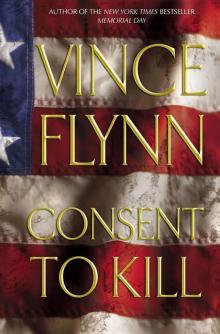 Consent to Kill
Consent to Kill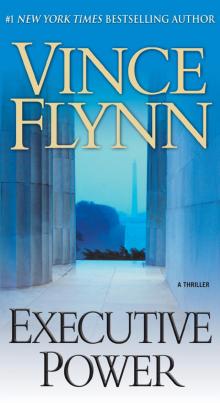 Executive Power
Executive Power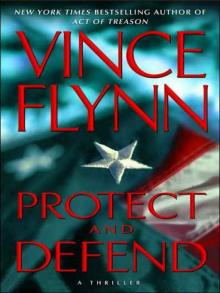 Protect and Defend
Protect and Defend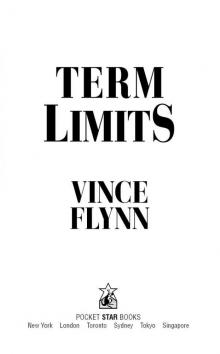 Term Limits
Term Limits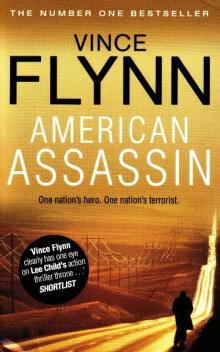 American Assassin
American Assassin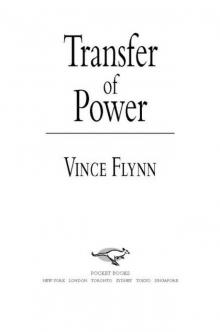 Transfer of Power
Transfer of Power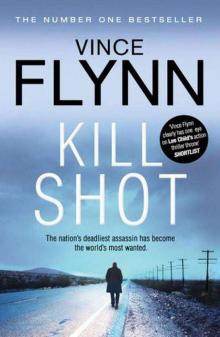 Kill Shot
Kill Shot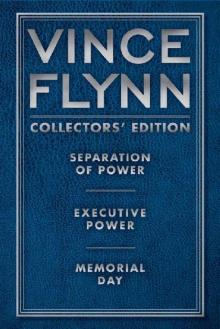 Vince Flynn Collectors' Edition 2
Vince Flynn Collectors' Edition 2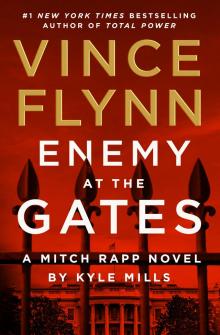 Enemy at the Gates
Enemy at the Gates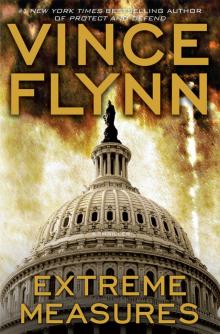 Extreme Measures
Extreme Measures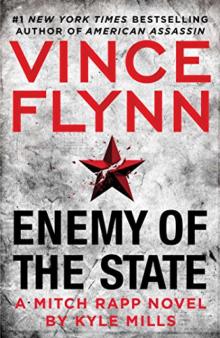 Enemy of the State
Enemy of the State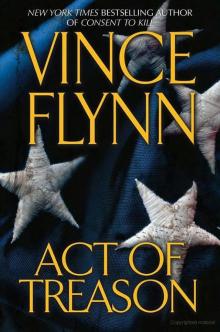 Act of Treason
Act of Treason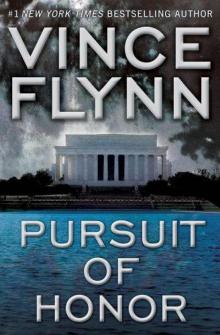 Pursuit of Honor
Pursuit of Honor The Survivor
The Survivor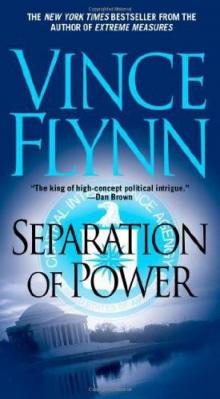 Separation of Power
Separation of Power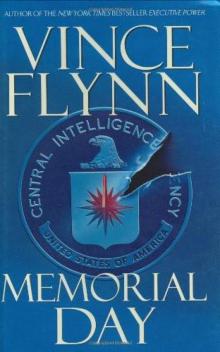 Memorial Day
Memorial Day The Last Man
The Last Man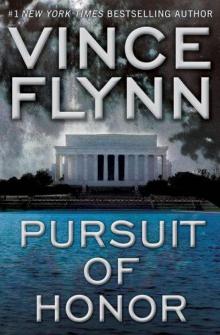 Pursuit of Honor_A Thriller
Pursuit of Honor_A Thriller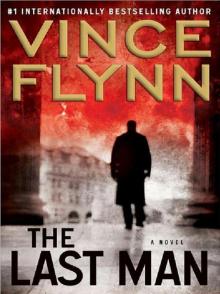 Mitch Rapp 13 - The Last Man
Mitch Rapp 13 - The Last Man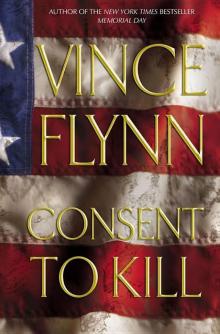 Consent to Kill:
Consent to Kill: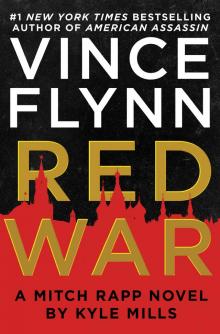 Red War
Red War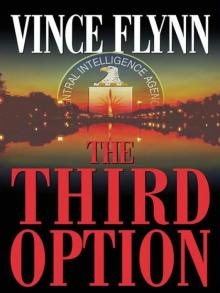 Mitch Rapp 02 - The Third Option
Mitch Rapp 02 - The Third Option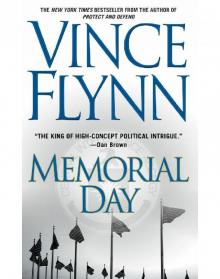 Mitch Rapp 05 - Memorial Day
Mitch Rapp 05 - Memorial Day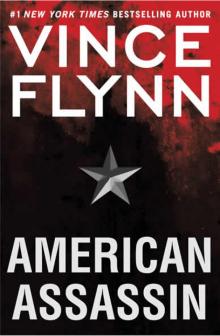 Mitch Rapp 11 - American Assassin
Mitch Rapp 11 - American Assassin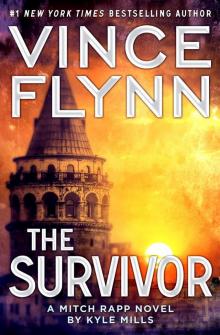 Mitch Rapp 14 - The Survivor
Mitch Rapp 14 - The Survivor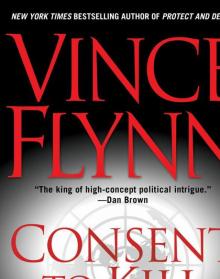 Mitch Rapp 06 - Consent to Kill
Mitch Rapp 06 - Consent to Kill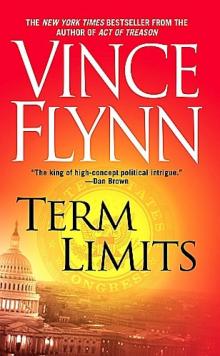 Term Limits mr-1
Term Limits mr-1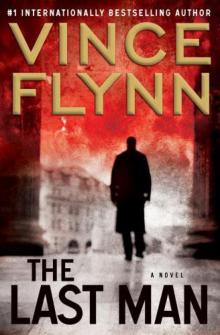 The Last Man mr-13
The Last Man mr-13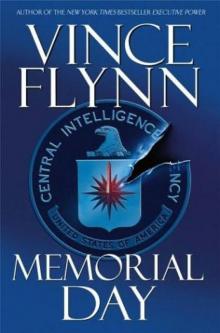 Memorial Day mr-5
Memorial Day mr-5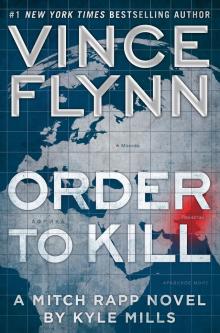 Order to Kill
Order to Kill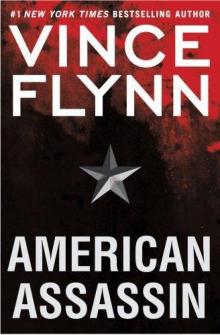 American Assassin: A Thriller
American Assassin: A Thriller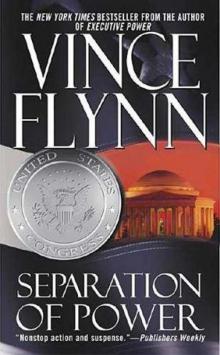 Separation of Power mr-3
Separation of Power mr-3